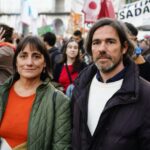
A reflection on “Kirchnerism unarmed” by Alejandro Horowicz. Editorial of “El Círculo Rojo”, a program on La Izquierda Diario that broadcasts on Thursdays from 10 p.m. to midnight on Radio Con Vos, 89.9.
See this post on Instagram
Sergio Massa / Cristina Fernández de Kirchner / Kirchnerism / Peronism / Alejandro Horowicz / Elections 2023
Source: www.laizquierdadiario.com

